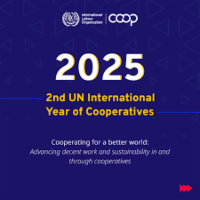Co-operatives Are At a Pivotal Point
By Kenzie Love

When the United Nations General Assembly declared 2012 as the first International Year of Co-operatives, it seemed to herald a bright future for the movement. With the theme of “Co-operative Enterprises Build a Better World”, the International Year of Co-operatives had three main objectives: increasing awareness, promoting growth, and establishing appropriate policies.
As CWCF Executive Director Hazel Corcoran notes, it was a heady time. There were large events including a summit in Quebec City held that year, the international Blueprint for a Co-operative Decade was unveiled, and numerous smaller- scale events took place.
“It was quite exciting,” she says. “It was something that I felt brought to some degree the co-op movement together across Alberta, across Canada, internationally in various countries, and kind of gave a platform for better promotion, because the co-op model is so poorly understood”.
Unfortunately, this increased understanding didn’t resonate with the federal government at the time, which in stark opposition to the aim of establishing appropriate policies, dismissed almost all of the important, helpful civil servants in the federal Co-operatives Secretariat, cancelled the federal Co-operative Development Initiative funding program without any replacement, and changed the RRSP rules for worker co-ops to make it harder for startups to use them. These moves came as a shock to Corcoran and others in the Canadian co-op movement.
“It was unbelievable,” she says. “So we tried to lobby to get them to change, and it did nothing; it was incredibly disappointing.”
Although the government’s actions were a blow to the co-op movement, CWCF and other organizations have continued to lobby for co-op friendly policies and achieved some recent successes, such as a commitment to give worker co-op conversions the same status under the Income Tax Act as Employee Ownership Trusts. Corcoran believes, however, that the co-op movement is at a pivotal moment both at home and abroad. She points to the insularity that has emerged in some sectors as a growing threat, as well as the significant number of demutualizations.
“I feel that there’s been a significant lack of cooperation in the co-operative movement,” she says. “It’s disappointing, and it’s sad.”
There is some hope on the horizon with the second International Year of Co-operatives, taking place in 2025, which the UN recently declared. Corcoran hopes that this designation will inspire co-ops of all stripes within Canada to come together around their shared values.
“My dream for 2025 is that the co-operative organizations will come together and truly cooperate,” she says.
So what would such cooperation look like? Corcoran dreams about the prospect of a meeting of an estates general, the French concept of “des États généraux”, which would bring together representatives from all of Canada’s co-op sectors to deliberate collectively on the state of the co-op movement, and plan for the future.
“An estates general is like a summit, but one in which people deliberate about how we should go forward,” she says. “It would be like a strategic planning session for the whole co-operative sector.”
Were such a gathering to take place, Corcoran believes the movement would find there is still cause for hope given the co-operative model’s great potential. But she worries what might happen if the opportunity presented by the UN-declared by the IYC 2025 is squandered.
“I feel like the Co-op movement is at an inflection point,” she says. “Where it’s either going to take off and capture the imagination of the population,” and people will be starting co-ops of all types: worker, renewable energy, healthcare, etc. Or it’s going to see its apex organizations continually weaken because the big members have been voting with their feet and walking out in some cases; or not joining, it’s an existential crisis.”
It is up to us in the co-operative movement, including but not only worker co-ops to step up and manage during the IYC 2025 — whether just events or strategic planning for the entire co-op sector. It’s truly a gift, but to accept it we must embrace principle 5 first and foremost: education about co-operatives.